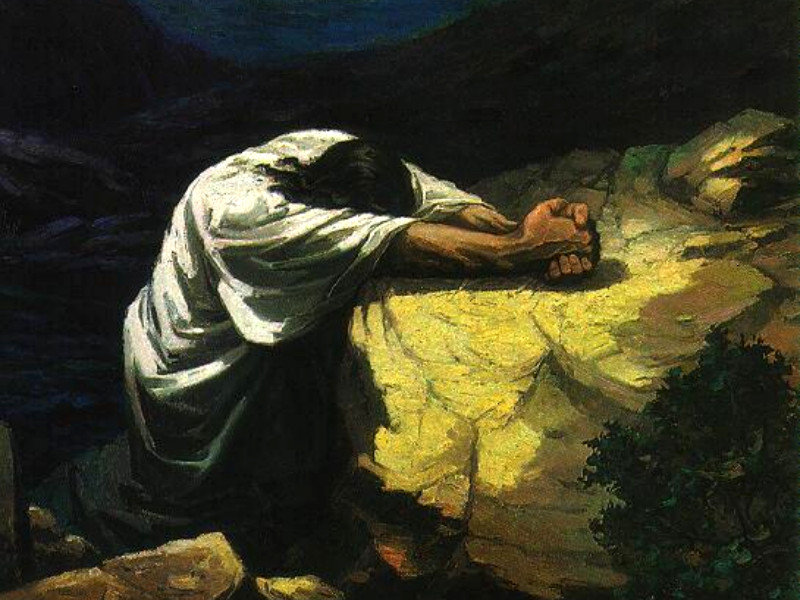“You shall not bow down to them or serve them; for I the Lord your God am a jealous God, visiting the iniquity of the fathers on the children to the third and fourth generation of those who hate me…” – Deuteronomy 5:9
This is a troubling verse at first glance. How can God say that he will visit the iniquity of the fathers upon the third and fourth generation, while elsewhere He emphatically swears by Himself that He will never punish a child for their parent’s sins? (see Ezekiel 18).
First, let’s Define God’s goodness, then ask if there is Darkness in Him, and then we’ll Defend God’s goodness.
DEFINING GOD’S GOODNESS
God’s goodness is defined in the person of Jesus Christ, for Jesus is the best revelation of God we have.
Scripture reveals that Jesus Christ as the GodMan is a perfect representation of His Father: He is “the brightness of His glory and the exact representation of His being” who is the preeminent revelation of who God is (Heb 1:3); Jesus affirmed He only ever did what He saw the Father doing (John 5:19); Jesus even said, “If you have seen me, you have seen the Father” (John 14:9). Even in the Old Testament, “No one has ever seen God [the Father] – the only-begotten of the Father [Jesus], He has revealed Him,” (John 1:18). The visions of prophets in the Old Testament of God enthroned were of the Word of God – Jesus, pre-incarnate. Torrance wrote, “There is no God behind the back of Jesus Christ,” for Jesus perfectly reveals the fullness of God (Col. 2:9).
DARKNESS IN GOD’S GOODNESS?
If Jesus Christ is the perfect revelation of the Father, how do we understand some of the other, “darker” things said about God – such as in Deuteronomy 5:9? For the heretic Marcion, the answer was that the God of the Old Testament was not the God who was Jesus’ Father. According to Marcion, Jesus had come to save us from the evil deity! The early Christians fought against such dualistic views.
Based on various teaching traditions, some Christians today believe a similar thing about God. The narrative (grossly distorted from the truth) is that the Father was too holy to deal with sinful people – He only burned with anger against them. So Jesus came, took our sins, and the Father poured out His wrath upon Jesus, turning His back on Him, and severing the Trinity for these moments. Now that all this has been completed, the Father looks at us and sees Jesus – not us. We are “snow covered dung,” as one Protestant theologian is rumored to have said.
The reader should be aware that such a view is a modern distortion of Penal Substitution, and the “broken Trinity” view was invented sometime in the last 150 years.
This view produces some tremendous theological problems, such as:
- Viewing Jesus as less pure than the Father (able to bear our sin while the Father could not),
- Claiming that Jesus did not represent the Father during redemption, but was merely the victim of the Father’s wrath,
- Showing that the Father, in fact, does not love us – He loves Jesus, and still does not really want to see us as we are.
Obviously such implications will not result in having a particularly God-honoring or God-trusting mindset.
DEFENDING GOD’S GOODNESS
The first thing we need to recognize is that Jesus is the supreme revelation of God; He is more clear than the prophets before Him (Hebrews 1:3). We can understand who God is as we study the gospel narratives and see the inspired and inerrant story of God-made-flesh. The Apostles, and the church they founded, provide us with commentary on Jesus’ actions and He revealed most fully to us the heart of the Triune God. If there are other things in the Bible which seem to conflict with Jesus’ revelation of God, we need to lean in the direction of seeing Jesus clearly and considering the other verses with wariness – wariness of our own tendency to misinterpret. “God is light, and in Him is no darkness at all” (1 John 1:5).
Secondly, we will do well to consult the Christian consensus through the ages on such matters. Rather than reading a book written thousands of years ago with our Westernized, individualistic, scholastic, Aristotelian mindsets and proclaiming ourselves our own Pope, we should listen to the wisdom of the ages.
I want to end with a poem written to rebuke Marcion’s views that the God in the Old Testament was harsh and cruel. Marcion pointed to this verse in Deuteronomy to say that the Old Testament God was evil and vengeful – not at all like Jesus. But this Christian author explains in poetry what God meant:
Slaying in whelming deluge utterly
Parent alike with progeny, and e’en
Grandchildren in “fourth generation”
now descended from the parent-stock
when He Has then for nearly these nine-hundred years assisted them.
Hard does the judgement seem?
The sentence savage? And in Sodom too,
That the still guileless little one unarmed
And tender should lose life: for what had e’er
The infant sinned? What cruel thou mayest think
Is parent-care’s true duty.
Lest misdeed
Should further grow,
crime’s authors He did quench,
And sinful parent’s brood.
But, with his sires,
The harmless infant pays not penalties
Perpetual, ignorant and not advanced in crime:
But lest he partner should become
Of adult age’s guilt,
Death immature undid spontaneous future ills.
(“Five Books in Response to Marcion”)
The author interprets God’s words in Deuteronomy as pointing back to His widespread judgement upon Sodom, and Noah’s flood – young people caught up in the judgment of their parents. And just as God blessed Jeroboam’s child with a natural death and burial “because in him something good was found toward the LORD God of Israel”, (1 Kings 4:12cf), so also the young, innocent ones in these circumstances are not punished with “penalties perpetual” – indeed, the destruction of their civilization (often characterized by worship of vile demons and child torture) graciously prevents them from becoming adult participants trained in the love of evil. They do not go to Hell. They are the earthbound victims of their parent’s sins, not the recipients of eternal condemnation.
For more on this subject, see:
Greg Boyd, Seeing God’s Beauty in the depth of Scripture’s violent portraits of God
Categories: Growing in the Lord




Do you know the author for the poem?
LikeLike
The author is unknown, but one may find the quote in the Ante-Nicene Fathers collection, Volume IV, page 157, or online here (see line 55): http://www.tertullian.org/anf/anf04/anf04-30.htm#P4647_752686
LikeLike
I can see your 3rd “theological problem” at work in my life, an undercurrent insecurity. I have heard what seems now a lifetime of the “snow covered dung” idea you quoted – perhaps a watered-down version, but still that idea. I am now thinking through my ideas about God’s love differently.
What is “the narrative” you mentioned? (Under “Darkness in God’s Goodness?”)
I re-read Duet. 5:9 to follow your article. I am just wondering how the poet you quoted was able to explain that verse since there are no more details in the verse about how that works, when God “visits the iniquity of the fathers…” I am only just learning about how to understand more than just the surface of verses like this, so I thought I’d ask how one comes to conclusions like this. Maybe it’s obvious… So bear with me!
LikeLike
To answer your other question, the “narrative” was just what was written in that paragraph: the idea that God the Father is “too holy” to be able to love us and deal with us (rather than our sin making us too sinful to be able to love God and deal with Him), and the thoughts that flow from it.
Glad that you are thinking about how much God really loves *you.* I’m really looking forward to publishing an article this week on Jesus’ revelation of the Father’s love for us. 🙂
LikeLike
Thanks Heather,
The early Christians used a very ‘right-brain’ approach to Scripture, if you will. Rather than get stuck on the exact words and what they meant – isolated from context – they tended to take a very broad & aesthetic approach. (incidentally, a really cool video on right-brain left-brain stuff, check this out: https://www.ted.com/talks/iain_mcgilchrist_the_divided_brain )
So the author might look at the verse and say, “When did God ever do something like this? Seems like never. Hmm… Ah! In the flood, and in large-scale judgments, the younger children would get caught up in the judgement.” Looking at what they knew from Apostolic catechesis and the flow of Scripture, the conclusion then follows. I don’t suspect it in this case, but in many cases I believe that early Christians are drawing from what I call an “Emmaus Hermenuetic” – that is, things Jesus taught from the Old Testament “concerning Himself.”
Is it for sure what God is saying in this case? We can’t really know. But we can know that God definitely doesn’t mean that the children are held morally guilty for their father’s sins (something Ezekiel 18 prohibits us from believing about God: “As I live, you shall not say this” ).
LikeLike